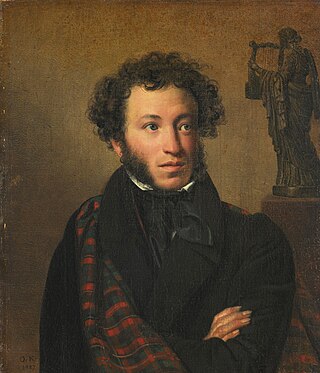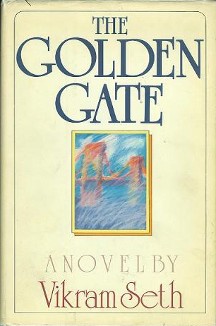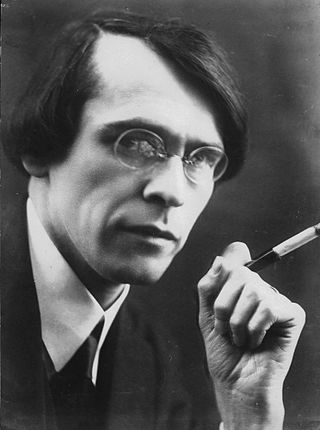
Alexander Sergeyevich Pushkin was a Russian poet, playwright, and novelist of the Romantic era. He is considered by many to be the greatest Russian poet and the founder of modern Russian literature.

Russian literature refers to the literature of Russia and its émigrés and to Russian-language literature. The roots of Russian literature can be traced to the Middle Ages, when epics and chronicles in Old East Slavic were composed. By the Age of Enlightenment, literature had grown in importance, and from the early 1830s, Russian literature underwent an astounding golden age in poetry, prose and drama. Romanticism permitted a flowering of poetic talent: Vasily Zhukovsky and later his protégé Alexander Pushkin came to the fore. Prose was flourishing as well. Mikhail Lermontov was one of the most important poets and novelists. The first great Russian novelist was Nikolai Gogol. Then came Ivan Turgenev, who mastered both short stories and novels. Fyodor Dostoevsky and Leo Tolstoy soon became internationally renowned. Other important figures of Russian realism were Ivan Goncharov, Mikhail Saltykov-Shchedrin and Nikolai Leskov. In the second half of the century Anton Chekhov excelled in short stories and became a leading dramatist. The beginning of the 20th century ranks as the Silver Age of Russian poetry. The poets most often associated with the "Silver Age" are Konstantin Balmont, Valery Bryusov, Alexander Blok, Anna Akhmatova, Nikolay Gumilyov, Sergei Yesenin, Vladimir Mayakovsky, and Marina Tsvetaeva. This era produced some first-rate novelists and short-story writers, such as Aleksandr Kuprin, Nobel Prize winner Ivan Bunin, Leonid Andreyev, Fyodor Sologub, Yevgeny Zamyatin, Alexander Belyaev, Andrei Bely and Maxim Gorky.

Eugene Onegin, A Novel in Verse is a novel in verse written by Alexander Pushkin. Onegin is considered a classic of Russian literature, and its eponymous protagonist has served as the model for a number of Russian literary heroes. It was published in serial form between 1825 and 1832. The first complete edition was published in 1833, and the currently accepted version is based on the 1837 publication.

Juri Lotman was a prominent Russian-Estonian literary scholar, semiotician, and historian of Russian culture, who worked at the University of Tartu. He was elected a member of the British Academy (1977), Norwegian Academy of Science and Letters (1987), Royal Swedish Academy of Sciences (1989) and Estonian Academy of Sciences (1990). He was a founder of the Tartu–Moscow Semiotic School. The number of his printed works exceeds 800 titles. His archive which includes his correspondence with a number of Russian and Western intellectuals, is immense.

Eugene Onegin, Op. 24, is an opera in 3 acts, composed by Pyotr Ilyich Tchaikovsky. The libretto, organised by the composer himself, very closely follows certain passages in Alexander Pushkin's 1825-1832 novel in verse, retaining much of his poetry. Tchaikovsky's friend Konstantin Shilovsky contributed M. Triquet's verses in Act 2, Scene 1, while Tchaikovsky himself arranged the text for Lensky's arioso in Act 1, Scene 1, and almost all of Prince Gremin's aria in Act 3, Scene 1.

Boris Nikolaevich Bugaev, better known by the pen name Andrei Bely or Biely, was a Russian novelist, Symbolist poet, theorist and literary critic. He was a committed anthroposophist and follower of Rudolf Steiner. His novel Petersburg (1913/1922) was regarded by Vladimir Nabokov as the third-greatest masterpiece of modernist literature. The Andrei Bely Prize, one of the most important prizes in Russian literature, was named after him. His poems were set to music and performed by Russian singer-songwriters.

The Golden Gate (1986) is the first novel by poet and novelist Vikram Seth. The work is a novel in verse composed of 590 Onegin stanzas. It was inspired by Charles Johnston's translation of Pushkin's Eugene Onegin.
Walter Werner Arndt was a world-renowned scholar and translator of Russian, German and Polish. At the time of his death, he was the Sherman Fairchild Professor of Humanities, Emeritus, of Russian Language and Literature at Dartmouth College. With degrees in business administration from Warsaw University, in political science and economics from Oxford University, a master's degree in engineering from Robert College (Istanbul), and a PhD in comparative literature from UNC, Chapel Hill, Arndt was well known for his metric translations, which included versions of Goethe's Faust, Aleksandr Pushkin's Eugene Onegin, a number of poems by Rainer Maria Rilke, as well as works by Busch, Morgenstern, and others. His translation of Eugene Onegin won the Bollingen Poetry Translation Prize in 1962.

Vladislav Felitsianovich Khodasevich was an influential Russian poet and literary critic who presided over the Berlin circle of Russian emigre litterateurs.

Ippolit Fyodorovich Bogdanovich was a Russian classicist author of light poetry, best known for his long poem Dushenka (1778).

Baron Anton Antonovich Delvig was a Russian poet and journalist of Baltic German ethnicity.

The book Notes on Prosody by polyglot author Vladimir Nabokov compares differences in iambic verse in the English and Russian languages, and highlights the effect of relative word length in the two languages on rhythm. Nabokov also proposes an approach for scanning patterns of accent which interact with syllabic stress in iambic verse. Originally Appendix 2 to his Commentary accompanying his translation of Aleksandr Pushkin's Eugene Onegin, Notes on Prosody was released separately in book form.
Elena Alexandrovna Kostioukovitch, is an essayist and literary translator. She is the winner of numerous literary awards, including the Best Translation of the Year in the USSR (1988), Zoil (1999), Grinzane Cavour Moscow (2004), Welcome Prize (2005) given by the Russian National Association of Restaurateurs, Bancarella (cucina) Award, Chiavari Literary Prize, and Premi Nazionali per la Traduzione. Resides with her husband and two children in Milan, Italy.
James E. Falen is a professor emeritus of Russian at the University of Tennessee. He published a translation of Eugene Onegin by Alexander Pushkin in 1990 which was also influenced by Nabokov's translation, but preserved the Onegin stanzas (ISBN 0809316307). This translation is considered to be the most faithful one to Pushkin's spirit according to Russian critics and translators.

Mikhail Leonovich Gasparov was a Russian philologist and translator, renowned for his studies in classical philology and the history of versification, and a member of the informal Tartu-Moscow Semiotic School. He graduated from Moscow State University in 1957 and worked at the Gorky Institute of World Literature, the Russian State University for the Humanities, and the Russian Language Institute in Moscow. In 1992 Gasparov was elected a full member of the Russian Academy of Science.
Stanley Mitchell was a British translator, academic, and author, noted for his English verse translation of Alexander Pushkin's Russian verse novel Eugene Onegin.
Chichrerin House was a historical landmark building located at Nevsky Prospekt 15 in Saint Petersburg, Russia. It is also known as Kosikovsky House, Elisseeff House and Barrikada cinema theater.

Mary Hobson (1926–2020) was a British writer, poet and translator. She wrote four novels and an autobiography. She translated Alexander Griboedov's Woe from Wit and his letters. Hobson also translated works by Alexander Pushkin. She won the Griboedov Prize and Pushkin Medal.

Eugene Germanovich Vodolazkin is a Russian scholar and author. Born in Kyiv in 1964, he graduated from the Philological Department of Kyiv University in 1986. In the same year, he entered graduate school at the Pushkin House in the department of Old Russian literature under Dmitry Likhachov. In 1990, he defended his graduate thesis 'On the Translation of the "Chronicle of George Hamartolos"'.

Elizarov Mikhail Yuryevich – is a modern Russian writer and singer-songwriter, laureate of the Russian Booker Prize in 2008 for the novel The Librarian.














